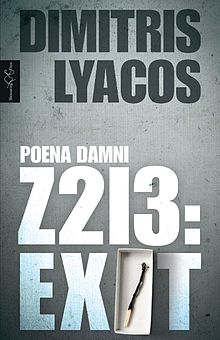Z213: Exit (Poena Damni)
Paperback – October 18, 2016
by Dimitris Lyacos (Author), Shorsha Sullivan (Translator)

This is a review of Z213: Exit by Dimitris Lyacos, translated from its original language (Greek) into English by Shorsha Sullivan.
Such seemingly mundane facts might not seem to be entirely relevant to a review, but as I’ll point out, they could be crucial, as this is no ordinary book. In many ways, it is hard to know if this is a series of connected poetry or a novel in poetic and experimental form.
Dimitris Lyacos was born in Athens in 1966 and is the author of the “Poena Damni” trilogy, of which Z213: EXIT is the first in narrative order (yet it was the last released). His work has been described as anything from postmodern, to genre-defying, to avant-garde. Lyacos has been compared to Cormac McCarthy and Samuel Beckett. Poena Damni is considered to be one of the most important works to come from Greece in modern times. Z213: EXIT references, or is influenced by some of the most important books in history, so it is with some excitement and trepidation that I read the first page.
The story follows an unknown narrator as he escapes from an institution. Much of the journey takes place on a train. Throughout the book, there is a sense of overwhelming darkness. This feat is so sharply executed that as a reader I felt the darkness like a saturated cloak, clinging to me, pulling me down, and its weight so heavy that I may never lift it. Lyacos gives us a sense of what it is to live life at the end of a matchstick. Desperately striking a match to see your surroundings, to read the Bible, a precious possession in a land of loss, through a sharp yellowed flame which dies within seconds. To scribble notes in spaces where you have not written and where someone else before you has not either, knowing that you may not make sense of what is there at a later point in time.
From the first page to last, Z213: EXIT is one word, unique. It certainly is not a traditional novel or conventional poetry, — the words themselves veer from neat, almost atomic precision to scattered unhinged lettering and sporadic lonely spaces. While the words themselves are often poetic, they quickly chop and change from what seemed like poetry to something else entirely.
Given the unique structure and lack of more traditional syntax, I found myself questioning if this was an accurate reflection of the source material. While I suspected the majority of it to be faithful, there was always a lingering element of doubt.
The narrator is ambiguous, certainly not an archetypal protagonist. His background is obscure and his motivations often unclear. Poena Damni means the pain of loss, a separation of the soul from God. It is this theme, this concept, that Lyacos is most successful in delivering. For there is a clear sense of pain in the loss of what has been, what is now apparent in this seemingly apocalyptic world, and what might come in future. Comfort is found only in scattergun memories, in sacred books used as pillows, in the rock of a train filled with religious symbolism and the worship of saintly relics, the yearning for intimacy, and a quest for understanding.
From the initial incarceration, where bodies are discarded into hellish pits, through to the escape itself, as readers, we are never entirely sure what it is he is running from, who is chasing him, nor where he hope to find answers. There are hints, of course; there are strong references to Moses, Ulysses, and Dante. Death haunts the world, and sometimes hell is a place that comes to us rather than something that awaits the demise of sinners. Lyacos brings us a hell that is very real and tangible.
Words like paranoia, claustrophobia, fear, and desire are the words I would use to describe the intensity of the narrator in their quest to escape, survive and understand.
Is this a masterpiece? For many, it will be. But for others, it will be too abstract, as it was for me. I enjoy different, unique, and experimental works. However, I couldn’t help but feel this was just out of reach for me. I suspect that is part of the genius of the work that may find some readers just as confused, detached, and incoherent as the narrator. In this sense, the book, the structure, the words and format all work incredibly well. Was it clever, inventive, and beautiful in its brutality? Yes. Did it change my life, like a masterpiece can, and perhaps should? No.
If there is any conclusion to be drawn from the book, it is up to each reader to find it.
At times, I felt it was re-enacting a biblical journey, such as Moses in Exodus (the parallels were clear here in many paragraphs),
“…take a rod, and stretch your hand over the sea and let the rod fall and rip it in two. And pass along the middle… I took the rod, and stretched my hand out over the sea… I passed then in between, on one side and on the other a red wall.”
I had a strong sense of the early days of Christianity while reading. According to the Catholic Church, the bones of St. Peter rest below St. Peter’s Basilica in the Vatican City. I was fortunate enough to visit deep below the layers of that magnificent building. The fact t hat it used to be a sacred location is almost beyond modern comprehension. In those ancient times, in the absence of answers, under intense poverty, subjugation, and persecution, people worshiped at the site of St. Peter’s death and burial. People wanted to be buried near his bones. In those times of turmoil, these relics became the focal point of answers and redemption. Lyacos says,
“…a pile that gathers in front of the saints, them joined together as well, one by the other, side by side, gaze on the people that kneel, a circle, that will protect them for now.”
But he doesn’t leave it there, he follows later by saying,
“And then the illusion dried up and it is an empty uninhabited house.”
At other times, I felt the narrator could have been exploring the horror of any human conflict from the Holocaust to the events in Syria today.
“And those who would raid the city what would they find to take from this place. Only the shadows of those who used to roam around the corridors between these shafts. And then going home one after the other. Mute.”
At some other times, it felt prophetic and frightening, with the most ground shaking observation coming with,
“…of the freedom which will be a burden to you.”
Here, our narrator questions if his freedom is worth it. If somehow, it is a further punishment.
I even found myself considering if this could be the journey of someone with dementia, escaping, only to discover that reality, sense of self, and even freedom itself are all walls that seem tangible but can be removed and questioned readily.
“It is you, all those, you are calling them objects, they are only names, however, that speak to the soul. And you have always the option to close your eyes and start afresh.”
In another piece of magic, Lyacos gives us this,
“…when I fled they didn’t even realise. They took no notice of me on one cared no one remembers. Now they will remember neither when nor how. Not even I. Tracks only, a hazy memory and those images when I look at what I have written, tracks of footprints in the mud before it starts raining again.”
Despite the explicit references to history, it is a highly relevant piece of contemporary artwork. The rendering of darkness, crime, exile, escape, and refugees seeking sanctuary are as vivid now as they were in the times of Moses.
In a world of Snapcha t, religious zeal, hatred, intolerance of others, incoherent politicians inciting division, celebrity opinions to our own. In a worship, unfathomable wealth, and abject poverty, trolls and violent civil war by social media, this book of detachment and loss makes perfect sense.
***
 Mark A. King has cooked for royalty, played football for the England manager, been in the close presence of a saint, and been held at gunpoint. All this was a long time ago, and now he enjoys worlds and characters far more bizarre, outlandish and alien – for these are the joys of writing and reading flash fiction. He’s proud to be one of the founders of the FlashDogs movement. His first novel, Metropolitan Dreams, was released early 2017 and he’s in the process of imagineering the sequel.
Mark A. King has cooked for royalty, played football for the England manager, been in the close presence of a saint, and been held at gunpoint. All this was a long time ago, and now he enjoys worlds and characters far more bizarre, outlandish and alien – for these are the joys of writing and reading flash fiction. He’s proud to be one of the founders of the FlashDogs movement. His first novel, Metropolitan Dreams, was released early 2017 and he’s in the process of imagineering the sequel.
He lives in Norfolk, UK, hiding from the psychotic calls of geese.
Chat to him on Twitter: @Making_Fiction
Visit his website: makingfiction.com
